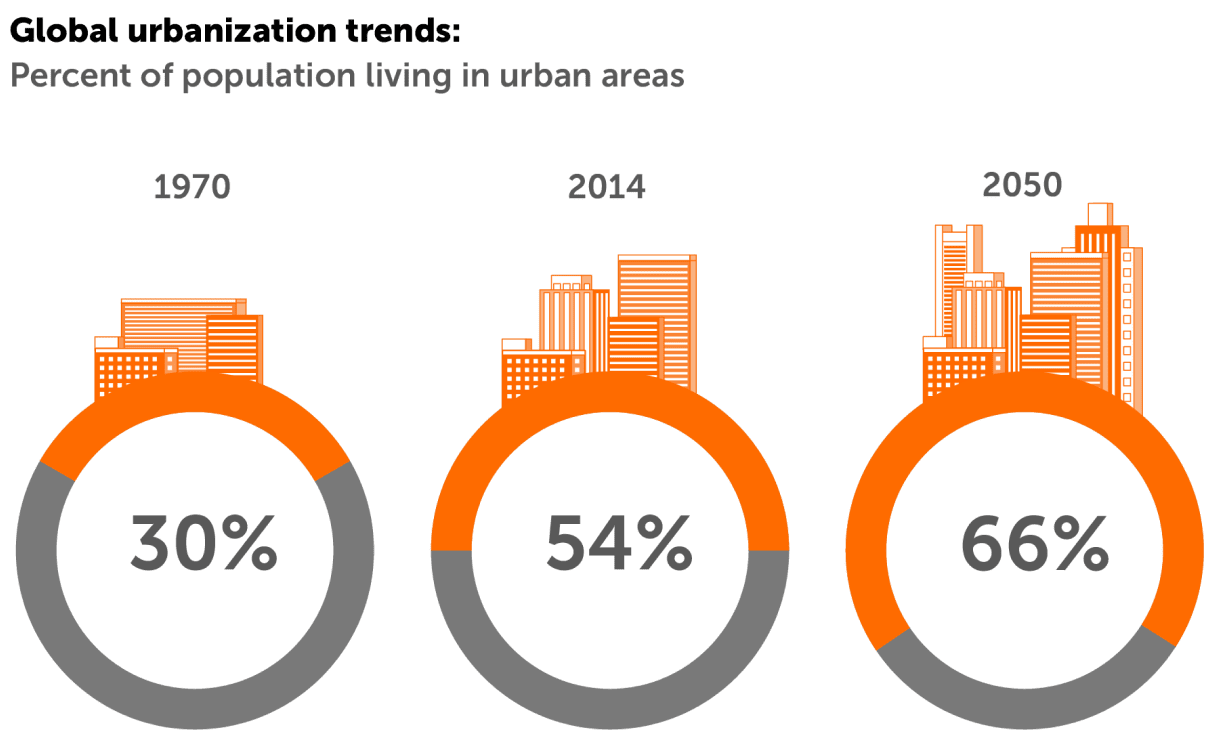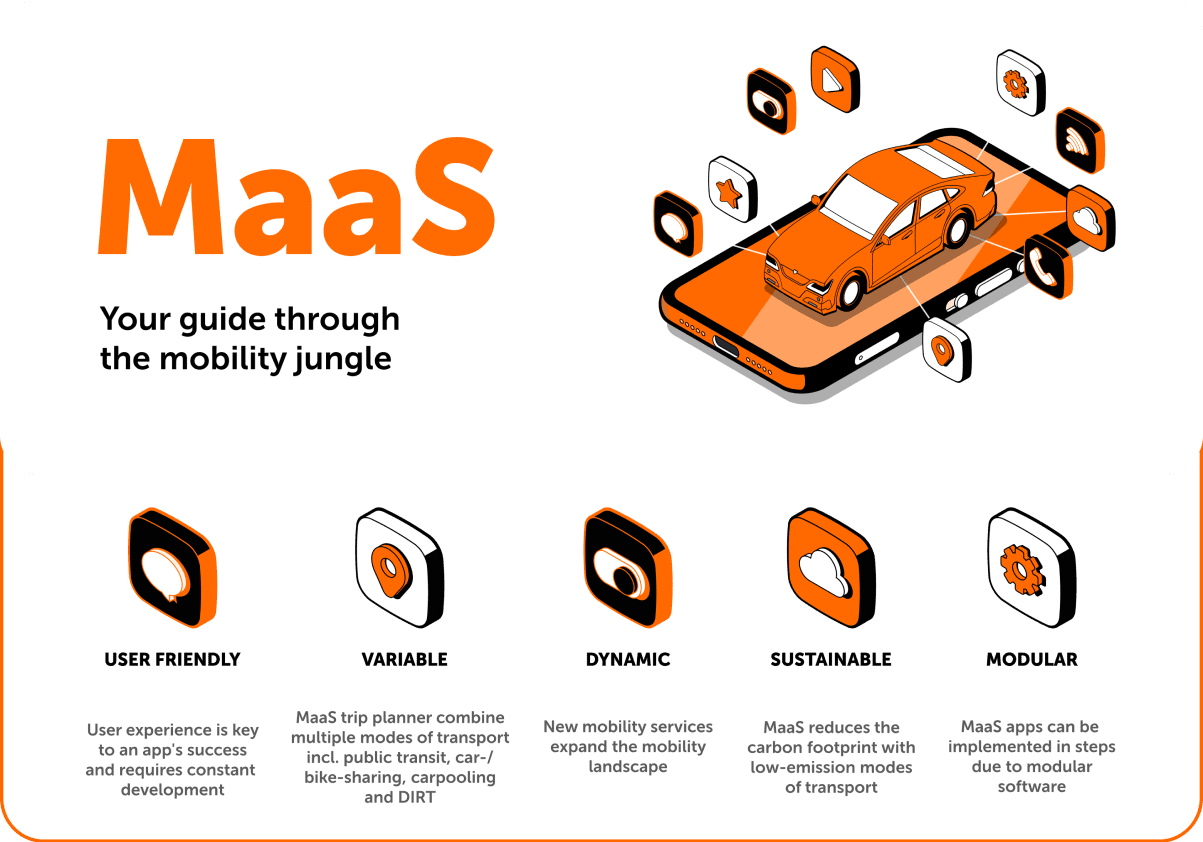Mobility as a Service (MaaS) is a concept that integrates various forms of transportation services into a single, accessible platform. It aims to provide users with a seamless and convenient experience for planning, booking, and paying for different modes of transportation, such as public transit, ridesharing, bike-sharing, car-sharing, and more.
The significance of MaaS lies in its potential to address transportation challenges in urban areas, including traffic congestion, pollution, and inefficient use of transportation infrastructure.


By offering users a range of transportation options through a unified platform, MaaS can encourage the use of sustainable modes of transportation, reduce the reliance on private car ownership, and improve overall mobility and accessibility for people in urban and suburban areas. As an example, the estimated value of the Global Car Sharing Market reached US$ 18.5 billion in 2023 and is projected to experience a robust Compound Annual Growth Rate (CAGR) of more than 15.8% during the forecast period from 2023 to 2030.
The significance of MaaS lies in its potential to address transportation challenges in urban areas, including traffic congestion, pollution, and inefficient use of transportation infrastructure.


Understanding MaaS Integration
MaaS functions as a digital hub where customers can conveniently organize their travel plans ahead of time. It facilitates the integration of various transportation choices into one seamless journey, spanning both public and private modes of transport and infrastructure, customized to meet individual user preferences. MaaS takes advantage of the contemporary dependence on mobile devices to support everyday decisions, ranging from dining choices to determining the optimal travel route.


Benefits of MaaS Integration


The core concept of the MaaS paradigm is to tailor mobility services to individual needs in real-time. MaaS platforms serve as tools for municipalities to promote environmentally friendly transport options such as public transit by integrating various modes seamlessly. By ensuring a comprehensive range of transport options that complement each other, MaaS encourages users to consider alternatives to private cars. MaaS platforms streamline the planning, booking, and payment processes, making trips simpler and more comparable to using private cars.
Companies that previously provided corporate cars are switching to a mobility budget. It is a financial allowance provided by an employer to an employee to cover various transportation expenses related to their work commute or business travel. This concept is gaining popularity as organizations seek to offer more flexible and sustainable commuting options to their employees.
They also offer opportunities for nudging users towards eco-friendly choices through features like prioritizing sustainable connections, displaying CO2 emissions, incorporating gamification, providing personalized recommendations, and sending push notifications about new mobility options.
Challenges and Solutions


MaaS platforms won’t instantly revolutionize the habits of die-hard car users but will prompt gradual reconsideration and adaptation. Both promotional efforts and dismantling the privileges of individual car use are crucial for MaaS to boost public transport. To effectively reduce car dependency, MaaS platforms need to:
- Emphasize transport diversity and engage users through targeted marketing efforts tailored to different user groups, offering enticing incentives to explore alternative transportation modes.
- Focus on urban areas initially due to their richer transport services, but also address rural areas by providing cost-effective on-demand transport to complement public transit.
- Prioritize accessibility, particularly for individuals with mobility limitations, ensuring comfortable first and last-mile options and reliable accessibility information.
- Integrate (private) cars sensibly into MaaS solutions, incorporating park-and-ride options, seamless parking fee payments, and car-sharing services, while also allowing for transparent comparison of costs, time, and environmental impact with other transport modes.
MaaS in GetTransfer.com


GetTransfer is a transportation platform that offers various mobility options, including taxis, private cars, and transfers between destinations. The concept of Mobility as a Service (MaaS) in GetTransfer involves providing users with a centralized platform where they can access and book different modes of transportation according to their needs.
MaaS in GetTransfer may also incorporate features aimed at promoting sustainable and eco-friendly transportation choices. This could include providing information about electric or hybrid vehicle options, encouraging carpooling, or integrating public transportation routes and schedules into the platform.
Future Outlook


Emerging trends and innovations in Mobility as a Service (MaaS) integration are continuously evolving, driven by advancements in technology and changing consumer preferences. Two key areas of innovation in MaaS integration include autonomous vehicles and AI-driven solutions. It holds tremendous potential to transform urban mobility, making transportation more efficient, convenient, and sustainable for users around the world. As these technologies continue to mature and become more widespread, we can expect to see further innovations and advancements in the MaaS ecosystem.
MaaS in GetTransfer may also incorporate features aimed at promoting sustainable and eco-friendly transportation choices. This could include providing information about electric or hybrid vehicle options, encouraging carpooling, or integrating public transportation routes and schedules into the platform.
Key findings
- Mobility as a Service (MaaS) integrates various transportation services into a single platform, addressing urban transportation challenges such as congestion and pollution.
- MaaS platforms streamline travel planning, booking, and payment processes, encouraging users to consider sustainable transport options while offering personalized recommendations and incentives.
- MaaS faces challenges in changing entrenched car use habits but can overcome them through targeted marketing, urban and rural accessibility initiatives, and sensible integration of private cars into MaaS solutions.
- GetTransfer.com offers a centralized platform for booking various transportation modes, promoting efficiency, sustainability, and ease of use for users.
- Emerging trends like autonomous vehicles and AI-driven solutions hold the potential to further transform urban mobility, making transportation more efficient, convenient, and sustainable globally. Continued innovation in the MaaS ecosystem is expected.














